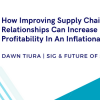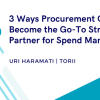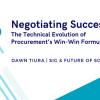Procurement is being presented with a good problem to have. Within most organizations, most categories have been sourced many times. However, procurement is still being asked to deliver incremental value to the companies they support and are now challenged to achieve value beyond just pricing. Due to this, 70% of procurement leaders report that finding more value from suppliers is their number-one tactic to increase procurement’s value in 2019 (Gartner SCM World Future of Supply Chain Survey, 2018). While the topic of Supplier Relationship Management (SRM) is not new, many organizations have a renewed focus to learn from the past and unlock the untapped value from supplier relationships.
Only a small number of organizations embrace SRM even though research shows that it reaps 12 times the SRM investment (Vantage Partners, 2018). So, what prevents most companies from developing, implementing and maintaining robust SRM? One could conclude from research and observation that three crucial areas need to be addressed:
- A fundamental change in thought and interaction
- Talent development in non-traditional procurement skills
- Overcomplicating the approach
1. Paradigm shift to a more collaborative approach
The very nature of most buyer and supplier interactions causes counterproductive behavior that obstructs the possibility of long term, collaborative relationships. Business has normalized opportunistic behavior and even encourages the practice of taking advantage of circumstances as they arise, with little regard for the other party. This is deemed to be competitive.
Most procurement organizations are functionally organized around cost cutting with many KPIs (Key Performance Indicators) focused on short-term optimization. To meet these objectives, procurement teams seek to drive down prices and expect suppliers to meet prescriptive KPIs, or face some form of penalty. Dealing in norms that are short-sighted and opportunistic will dictate that the nature of the relationship is a highly competitive game of win or lose for both parties. In turn, it creates relationships founded on mistrust and guarded communications.
Since not all supplier relationships are created equal, those suppliers that are deeply embedded into an organization (like outsourcing, large technologies, etc.) should be a focus in adopting mutual mindsets to eliminate opportunism. Through this collaborative approach with selected suppliers, procurement can understand and prove to executive leaders the overall value that can be achieved, including short-term total cost of ownership decreases.
2. Developing new skills
Talent development continues to be a top issue revealed through benchmark reports and industry surveys. procurement talent has developed primarily around short-term optimization, contributing to spend and cost reduction. Thus our skill-building has revolved around functional competencies such as negotiation, data/market analysis, contracting, and cost and risk management. Though these hard skills have served its purpose, optimally leveraging critical relationships and suppliers’ ideas and expertise requires soft skills like influencing, change management, building trust, problem-solving, team building and effective communication.
Mind-sets and talent should be developed to understand and enhance the role of suppliers. Influencing and changing behaviors that enable collaborative partnerships does not only change the game with supplier relationships, but also internal stakeholder relationships. Academia has led in identifying and offering training methods for these skills, but procurement should invest broadly in its own talent development, shifting from traditional technical skills to SRM-oriented competencies. Global-leading purchasing organizations recognize this need and invest anywhere from 50% to 70% of total budgets in employing and developing its talent (Vantage Partners, 2018).
3. Overcomplicating the approach
Some procurement organizations get stuck in thinking that to build SRM capabilities that large investments need to be made in technology, resources and time. Yes, all those investments are fantastic to have, but are not required to have success in becoming a customer of choice for suppliers. Many companies have seen success through one simple approach – helping suppliers become more successful. One could compare this thought process to how we lead our teams. As leaders, we understand how to develop our employees, give them opportunities to grow and measure success against mutually agreed to goals. We also, as effective leaders, build trust between us and our employees and understand how to grow them. The same should be applied to our suppliers. Finding simple ways to help our suppliers grow is the fastest path to becoming a customer of choice and reaping a much higher ROI as a result.
The essential role that suppliers play in adding incremental value to procurement and the companies they serve is increasing the need for true relationship building. When this occurs, procurement will have the opportunity to unlock tremendous value well outside of the traditional approach of price negotiations. Effective SRM the key to increased innovation and problem-solving, lower overall cost and reduced supply chain risks.
Region:









